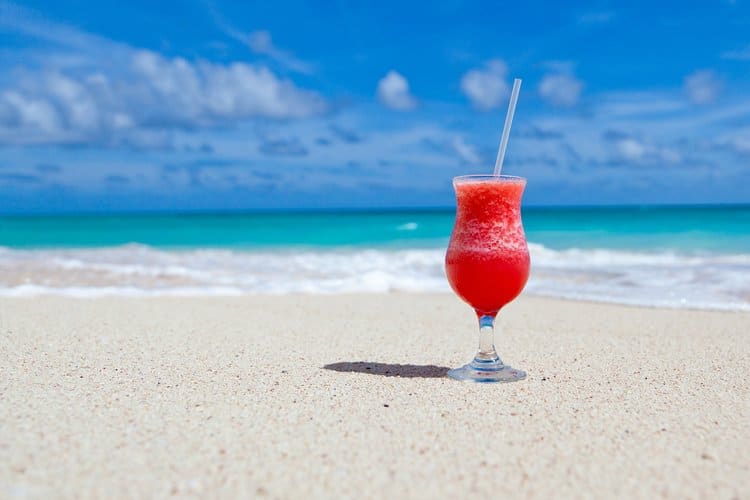If you have type 2 diabetes it comes with you as baggage wherever you go on holiday.
When you’re in a new place your usual routine can go out the window, which can have a detrimental effect on your blood sugar levels. Luckily, Dr Sarah Brewer working in association with CuraLin, the type 2 diabetes supplement offers her top tips for travelling with type 2 diabetes.
1. Don’t be tempted by the all-inclusive bar
On holiday you want to let your hair down and relax but it’s wise to find other ways to do this than drinking alcohol.
Dr Brewer explains, “When you have diabetes, drinking alcohol can cause your blood glucose levels to either rise or fall, depending on how much you have eaten, how much alcohol you consume, how quickly, and the amount of carbohydrate present in the drink or mixer. Beer and sweet wine can cause blood glucose levels to rise”.
- Alcohol stimulates appetite so you are more likely to over eat.
- Alcohol also affects judgement and will power so you are less likely to make healthy food choices.
- Alcohol provides ‘empty’ calories that are readily converted into fat in the body, raising triglyceride levels and contributing to fatty changes in the liver and pancreas, which are associated with insulin resistance.
- The calories provided by alcoholic drinks also make it difficult to lose weight.
- Alcohol can interfere with the beneficial effects of anti-diabetes medications.
Dr Brewer recommends for type 2 diabetics drinking alcohol “Moderation is key, as excess alcohol increases insulin resistance and the risk of hypertension, abnormal heart rhythms, fatty liver changes, low blood glucose levels (hypoglycemia) and promotes obesity.
If you are trying to lose weight, limiting your alcohol intake is an easy way to cut back on calories. If you have diabetes, your doctor may suggest that you only drink one or two units of alcohol per day.
Only drink alcoholic drinks when your blood glucose levels are well controlled, drink alcohol with food, drink slowly and avoid sugary drinks as mixers.”
2. Try the local delicacies
If you’re holiday destination’s local cuisine is spicy then try it! Dr Brewer explains, “Numerous spices such as cinnamon, ginger, fenugreek, turmeric, cumin, coriander, mustard seed and curry leaves all have evidence for improving glucose control. Cinnamon, for example, may improve glucose tolerance through an effect on insulin receptors.
The results from 10 trials involving 543 people with type 2 diabetes show that cinnamon significantly lowers fasting glucose levels compared with placebo.
The spices turmeric and fenugreek are used in traditional Ayurvedic medicine to treat type 2 diabetes and are combined with other herbal ingredients in CuraLin.
3.Snack on delicious native fruits
Fruit always seems to taste better on holiday when you’re in sunnier climates. Dr Brewer recommends fruit as a healthy snack. “Eat fruit as a healthy snack. Although fruit contains natural sugars, most have a low to moderate glycemic index and do not raise blood glucose levels excessively (though don’t over-indulge in dried fruits).
A study involving 38,000 women found those eating at least one apple a day were 28% less likely to develop type 2 diabetes than those eating no apples, while a recent analysis of 5 trials, involving almost a quarter of a million people, found that regular consumption of apples and pears is associated with an 18% reduced risk of type 2 diabetes.”
Fruit is ideal for type 2 diabetics on holiday as it’s easy to get hold of and perfect for throwing in your bag before a day at the pool or beach.
4. Be careful when sunbathing
It is so tempting to lie out in the sun all day and catch a tan but be wary of doing so if you have type 2 diabetes. Dr Brewer explains, “Heat can lead to dehydration and affect glucose levels.
Drink sufficient fluids to maintain good hydration. Avoid prolonged sunbathing, which can raise blood glucose levels and always keep medication cool.
5. Advice for packing your medication
“Take sufficient medication with you – it’s usually advisable to carry with you twice as much medication as you would normally need to cover for unexpected delays or losses. As well as this, keep medication in its original packs and carry it in hand luggage.
You will need a letter from your GP or diabetes specialist if travelling through security/customs with medication or medical devices.
This will also help if you need to replace lost medication or need medical treatment abroad. Also, always continue to take regular medication while travelling, if you’re crossing time zones; ask your doctor if you need to alter the timing of your medication.
